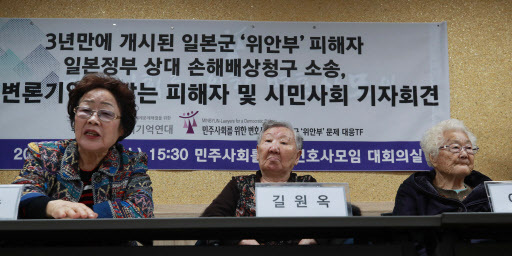The first hearing in a lawsuit brought against the Japanese government by former victims of Japanese military sexual slavery was held Wednesday, nearly three years after the suit was filed.
The Japanese government, which had delayed court proceedings by refusing to accept South Korean court-issued documents demanding its presence in court, was absent from the hearing at the Seoul Central District Court.
 |
(Yonhap) |
Eleven survivors and 10 bereaved family members representing six other victims filed suit against the Japanese government on Dec. 28, 2016, seeking damages in the amount of 200 million won each after a 2015 deal between Seoul and Tokyo failed to meet the victims’ demands.
Now, only five of the survivors who filed suit are still alive.
Earlier in the day, three of them called for an apology and formal reparations from the Japanese government.
“Isn’t it that the Japanese government is not proud (of what they did)? If proud, participate in the trial,” Lee Yong-soo, a 91-year-old survivor, said at a press conference ahead of the first hearing. “(What we demand) is not money, it is an apology.”
Lee also slammed the Japanese government for impeding the Korean civic group-led efforts to have records related to Japanese military sexual slavery inscribed in the UNESCO Memory of the World Register.
“We must have the history of comfort women listed on the UNESCO. Japan must cooperate,” Lee said.
The long-delayed court hearing for the former “comfort women” offers the last chance for the restoration of the victims’ honor and human dignity, their advocates said, calling on the court to make a ruling that serve justice.
The victims filed a total of four suits with a Japanese court seeking damages from the Japanese government, but lost.
In refusing to award compensation, the Japanese courts cited either the statute of limitations, state immunity or a 1965 treaty that normalized Seoul-Tokyo relations. State immunity is a legal doctrine by which a sovereign state is immune to civil suits or criminal prosecution in the courts of other states.
The lawyers representing the victims argue that state immunity cannot apply to cases where grave violations of human rights were committed. They say the victims of Japan’s 1910-45 colonization of Korea retain their individual rights to seek compensation for their suffering.
Since the suit was filed, the Japanese government has refused to accept court documents demanding its presence in Korean court on three occasions, which activists denounce as deliberately impeding court proceedings.
In May 2019, Tokyo asked Seoul for a dismissal of the case, citing state immunity.
After three failed attempts, the Korean court considered the documents as having been delivered and set a date for the court proceedings. Deliberations for a civil suit can proceed without the defendant’s presence.
Tokyo claims the issue was settled under the 1965 treaty and a 2015 deal signed by the previous Park Geun-hye administration, which Seoul and Tokyo called “final and irreversible.” Under that deal, Japan apologized to the victims and provided 1 billion yen for a Korea-run foundation.
The Moon Jae-in administration later said the deal was “flawed” and dissolved the foundation.
The first hearing comes amid an intensifying diplomatic row between Seoul and Tokyo after Korea’s top court last year ruled that Japanese firms must compensate Korean victims of wartime forced labor.
In apparent retaliation against the ruling, Japan tightened restrictions on exports to Korea and removed the country from its list of favored trading partners, which led many Koreans to boycott Japanese goods and services and led the Korean government to announce that it would not renew a bilateral intelligence-sharing pact when it expires Nov. 23.
The next hearing is scheduled for Feb. 5.
By Ock Hyun-ju (
laeticia.ock@heraldcorp.com)







![[Today’s K-pop] Blackpink’s Jennie, Lisa invited to Coachella as solo acts](http://res.heraldm.com/phpwas/restmb_idxmake.php?idx=644&simg=/content/image/2024/11/21/20241121050099_0.jpg)
